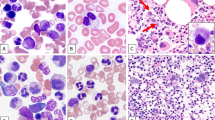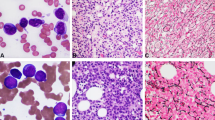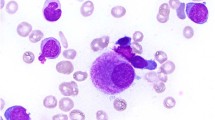Abstract
Although the presence of a chromosome 11q23 breakpoint is of recognized poor prognosis in acute lymphoblastic leukemia, its prognostic significance in acute myeloid leukemia (AML) has been the object of conflicting reports, perhaps reflecting the possibility of different entities. It has been found that only typical and generally balanced 11q23 chromosomal anomalies involve the MLL gene while atypical and generally unbalanced do not. To determine whether these two categories of AML patients had different initial characteristics and evolution, supporting different pathogenetic mechanisms, we analyzed clinical and biologic characteristics of newly diagnosed AML patients with balanced 11q23 breakpoint and/or MLL rearrangement seen over a 10-year period in our institution and compared them to cases with unbalanced 11q23 anomaly seen over the same period. These two categories of patients were compared with newly diagnosed patients with normal karyotype and no MLL rearrangement when tested, seen over the same period of time and treated similarly. Over this period, 442 newly diagnosed adult (>15 years) AML seen in our institution had a successful karyotype performed before any therapy. Thirty-six cases (8%) had a chromosome 11q23 breakpoint including 19 cases with a balanced translocation or inversion and 17 cases with an unbalanced anomaly. Eighty-seven recently diagnosed cases of AML, for whom frozen cellular material was available, were analyzed by Southern blot for the presence of MLL gene rearrangement. Fourteen cases (16% of the tested cases) had a rearrangement of the MLL gene, including seven cases with an apparently successful karyotype not showing any 11q23 breakpoint and two cases with no available karyotype. The only case with unbalanced 11q23 chromosomal anomaly which was tested had no MLL rearrangement. There was a clear-cut clinical difference between the 28 patients having a balanced 11q23 anomaly/MLL rearrangement and the 17 patients having an unbalanced chromosomal anomaly: AML with unbalanced 11q23 anomalies occurred in older patients (P = 0.07), tended to be less frequently associated with previous exposure to topoisomerase II-active drugs and with M4/M5 FAB cytological subtypes, were always associated with other chromosomal anomalies (P < 0.0001), expressed more frequently the cd34 antigen (P = 0.05) and were of considerably poorer prognosis for achievement of CR (P = 0.005) and survival (P = 0.0005). When compared to the control population, patients with balanced anomalies had more frequent history of toxic exposure (P = 0.0003) particularly to topoisomerase II-active drugs, tended to be more frequently of M4/M5 FAB subtypes (P = 0.07), expressed more frequently HLA-DR antigen (P = 0.02) and had shorter DFS (P = 0.02). Patients with unbalanced anomalies had more frequent splenomegaly (P = 0.009), lower WBC count (P = 0.04), and much poorer prognosis for CR achievement (P = 0.0001), survival (P < 0.0001) and dfs (P = 0.01). This study confirms the high frequency of 11q23 chromosomal breakpoint/MLL rearrangement in adult AML and the probable existence of two different entities with different clinical features according to the presence of a balanced or unbalanced cytogenetic abnormality, the latter being not associated with MLL rearrangement.
This is a preview of subscription content, access via your institution
Access options
Subscribe to this journal
Receive 12 print issues and online access
$259.00 per year
only $21.58 per issue
Buy this article
- Purchase on Springer Link
- Instant access to full article PDF
Prices may be subject to local taxes which are calculated during checkout
Similar content being viewed by others
Author information
Authors and Affiliations
Rights and permissions
About this article
Cite this article
Archimbaud, E., Charrin, C., Magaud, JP. et al. Clinical and biological characteristics of adult de novo and secondary acute myeloid leukemia with balanced 11q23 chromosomal anomaly or MLL gene rearrangement compared to cases with unbalanced 11q23 anomaly: confirmation of the existence of different entities with 11q23 breakpoint. Leukemia 12, 25–33 (1998). https://doi.org/10.1038/sj.leu.2400853
Received:
Accepted:
Published:
Issue Date:
DOI: https://doi.org/10.1038/sj.leu.2400853
Keywords
This article is cited by
-
Targeting cytohesin-1 suppresses acute myeloid leukemia progression and overcomes resistance to ABT-199
Acta Pharmacologica Sinica (2024)
-
Nanoparticle-mediated targeting of the fusion gene RUNX1/ETO in t(8;21)-positive acute myeloid leukaemia
Leukemia (2023)
-
Validation of the revised IPSS at transplant in patients with myelodysplastic syndrome/transformed acute myelogenous leukemia receiving allogeneic stem cell transplantation: a retrospective analysis of the EBMT chronic malignancies working party
Bone Marrow Transplantation (2017)
-
Prognostic significance of 11q23 aberrations in adult acute myeloid leukemia and the role of allogeneic stem cell transplantation
Leukemia (2013)
-
Allogeneic hematopoietic cell transplantation for myelodysplastic syndrome: prognostic significance of pre-transplant IPSS score and comorbidity
Bone Marrow Transplantation (2010)



